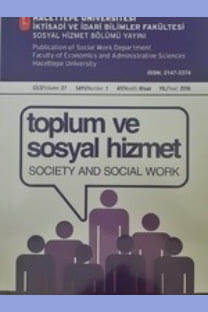Atipik ve Tipik Çocuklu Türk Ailelerinde Ebeveyen Stresi: Ne Öğrenebiliriz?
Ebeveyn stresi, sosyal destek sistemleri, 4-7 yaş arası tipik ve atipik çocuklar
PARENTAL STRESS IN TURKISH FAMILIES WITH ATYPICAL AND TYPICAL CHILDREN: VVHAT CAN WE LEARN?
___
- Arcus, M. E., Schvaneveldt, J. D., ve Moss, J. J. (1993) Handbook of Family Life Education. (Vol. 2). New York: Sage Publications.
- Bailey, Jr. D. B., Blasco, P. M. ve Sime- .onsson, R. J. (1992) “Needs Expressed by Mothers and Fathers of Young Children with Disabilities". American Journal on Mental Retardatİon, 97 (1), 1-10.
- Bronfenbrenner, U. (1977) “Toward an Experimenta! Ecology of Human Devel¬opment’'. American Psvcholoaist 32. 513-531.
- Crnic, K. A., Friedrİch, W. N., ve Green- berg, M. (1983) “Adaptatİon of Families with Mentally Retarded Children: A Model of Stress, Coping, and Family Ecology". American Journal of Mental Defıciency, 88 (2), 125-138.
- Dunst, C. J., Trİvette, C. M., ve Hamby, W. (1994) “Measuring Social Support in Families with Young Children with Disabilities”. İn C. J. Dunst, C. M. Trivette, ve A. G. Deal (Eds.), Supporting and Strengthening Families: Vol. 1. Methods, Strategies and Practices (pp. 152-160). Cambridge, MA: Brookline Books.
- Fewell, R. R. (1991) "Parenting Moderately Handicapped Persons”. İn M. Seligman (Ed.), The Family With A Handicapped ChildBoston, MA: Allyh and Bacon.
- Floyd, F. J. ve Gallagher, E. M. (1997) “Parental Stress, Care Demands, And Use of Support Services For School-Aged Children With Disabilities and Behavior Problem s”. Family Relations, 46 (4), 359-371.
- Friedrich, W. N. (1979) “Predictors of the Coping Behavior of Mothers of Handicapped Children". Journal of Consulting and Clinical Psychology, 47 (6), 1140- 1141.
- Friedrich, W. N., Greenberg, M. T., ve Crnic, K. A. (1983) "A Short Form of the Questionnaire On Resources and Stress”. American Journal of Mental Defıciency, 88 (1), 41-48.
- Friedrich, W. N., VVilturner, L. T., ve Cohen, D. S (1985) “Coping Resources and Parenting Mentally Retarded Children”. American Journal of Mental Deficiency, 90 (2), 130-139.
- Glidden, L. M. (1993) “What We Do Not Know About Families With Children Who Have Developmental Disabilities: Questionnaire On Resources And Stress As A Case Study”. American Journal on Men¬tal Retardation, 97 (5), 481-495.
- Gordon, T. (1970) P.E.T. Parent Effectiveness Training. The Tested New Way to Raise Responsible Children. New York: Wyden.
- Harris, V. S. ve McHale, S. M. (1989) “Family Life Problems, Daily Caregiving Activities, and the Psychological Well - Being of Mothers of Mentally Retarded Children”. American, Journal on Mentol Retardation, 94 (3), 231-239
- Honig, A. S. (1989) “Cross-Cultural Aspects of Parenting Normal and at Risk Children”. Early Child Development and Care, 50, 1-8.
- Honig, A. S., ve Vesin, C. C. (1987) “Stress Factors Among Overvvhelmed Mothers of Toddlers in Immigrant Families in France”. Early Child Development and Care, 28, 37-46.
- Honig, A. S. ve Winger, C. (1997) “A Professional Support Program for Fami¬lies of Handicapped Preschoolers: Decrease in Maternal Stress”. Journal of Primary Prevention, 17(3), 285-296.
- Honig, A. S. ve Matsushita, W. (1997) Employed Parental Roles With Preschool Children: Division Of Childcare Activities And Satisfaction With Degree Of Participation. Unpublished Manuscript, Syracuse University, New York.
- Levy-Shiff, R. (1986) "Mother-Father- Child Interactions in Families With a Mentally Retarded Young Child”. American Journal of Mental Deficiency, 91 (2), 141-149.
- Lyon, S. R. ve Lyon, G. A. (1991) “Collaboration with Families of Persons With Severe Disabilities”. in M. Seligman (Ed.), The Family With a Handicapped Child. Boston, MA: Allyn and Bacon.
- Marcenko, M. O. ve Meyers, J. C. (1991) “Mothers of Children with Developmental Disabilities: Who Shares the Burden? Family Relations, 40, 186-190.
- Meyer, D. J. (1986) “Fathers of Children with Mental Handicaps”. in M. E. Lamb (Ed.), The Fathers Role: Applied Perspective. New York: John Wi!ey ve Sons.
- Minuchin, S. (1974) Families and Family Therapy. Cambridge, MA: Harvard University Press.
- Seligman, M. (1991) “Family Systems and Beyond”. in M. Seligman (Ed.), The Family with a Handicapped Child. Bos- ı ton; MA: AHyn.ve .Bacon.
- Seligman, M. ve Darling, R. B. (1997) Ordinary Families, Special Children: a System Approach To Childhood Disability. New York: The Guilford Press.
- Shure, M. (1994) Raising a thinking child. Help Your Young Child to Resolve Everyday Conflicts and Get Along with Others. New York: Henry Holt.
- Waisbren, S. E. (1980) “Parents’ Reactions After The Birth Of a Developmentally Disabled Child". American Journal of Mental Defıciency,_24. 345-351.
- Wikler, L. (1981) “Chronic Stresses of Families of Mentally Retarded Children”. Family Relations, 30, 281-288.
- Wolfensberger, W. (1967) “Counseling the Parents of the Retarded”. in A. A. Baumeister (Ed.), Mental Retardation, Appraisal, Education and Rehabilitation. Chicago: Aidine.
- World Health Organization (1981) Social Dimensions of Mental Health. Geneva: World Health Organization.
- ISSN: 2147-3374
- Yayın Aralığı: 4
- Başlangıç: 2000
- Yayıncı: Hacettepe Üniversitesi İktisadi ve İdari Bilimler Fakültesi
AİLEYE YÖNELİK PLANLI MÜDAHALE SÜRECİNİN AŞAMALARI
BATI AVRUPA’DA YAŞAYAN GÖÇMEN TÜRK AİLELERİNİN UYUM VE BÜTÜNLEŞME SORUNLARI
Atipik ve Tipik Çocuklu Türk Ailelerinde Ebeveyen Stresi: Ne Öğrenebiliriz?
Özkan ÖZGÜN, Alice Sterling HONIG
ÇALIŞAN VE ÇALIŞMAYAN KADINLARIN SAĞLIKLI YAŞAM BİÇİMİ DAVRANIŞLARININ İNCELENMESİ
Handan ZİNCİR, Emel EGE, Rukiye AYLAZ, Nevzat BİLGİN, Sermin TİMUR
DÜNYADA SOSYAL HİZMET MESLEĞİNİN ORTAYA ÇIKIŞI VE GELİŞİMİ
Hakan ACAR, Gülsüm ÇAMUR DUYAN
AİLEDE KRİZLER VE SOSYAL HİZMET
KÜLTÜREL SEMBOLLERİ YORUMSAMACI BİR BAKIŞ AÇISIYLA OKUMA VE SOSYAL HİZMET İLİŞKİSİ
